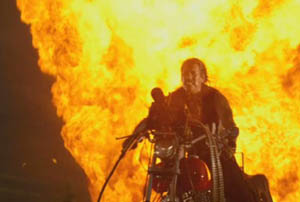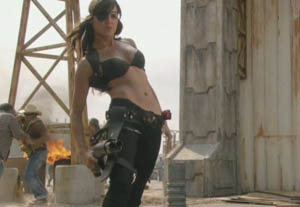|
Who would have ever thought that perennial B-movie heavy and former San Quentin inmate Danny Trejo would, at the age of 66, be top billed in a film also starring Robert De Niro? Probably not him, let's just say. Machete is a throwback to the era of cheap exploitation films with over-the-top violence and randomly naked chicks. While not as directly a parody as last year's hilarious Black Dynamite, it still very often hits exactly the right buttons. If you like those buttons, you'll like this film. If not, too bad. 
The plot is instantly familiar to anyone who's ever seen a revenge flick from the 1970s, or fifty of them. A good cop in a corrupt system has his life destroyed for refusing to roll over, and eventually gets his chance to wreak bloody vengeance. Being a Mexican cop (and not one played by Charleton Heston), he escapes to the US and hides out amongst the day laborers until the fateful day comes when he's approached with an offer to assassinate a virulently bigoted US Senator entrenched in the same Mexican drug trade that claimed his family. It turns out to be a double-cross set up by the Senator's own manager, who, as played by Jeff Fahey, is about as perfect a slimy '70s villain as you could hope to get. From there, Machete plunges into a world of conspiracies, revolutions, beheadings, and lots of randomly naked women-in fact, Michelle Rodriguez is about the only female cast member who manages to keep her clothes on, which is a bit of a shame. Now, if you're a humorless, hard-right clod who hates immigrants, you might not like Machete. The satire is laid on thick, so thick as to render any discussion of narrative subtlety completely laughable; I've never before seen any movie so deberately designed to outright piss off American conservatives, who are painted as yee-hooing good old boys with rifles, murderous intent and necks as red as Georgia clay. However, whatever director Robert Rodriguez's personal feelings about the immigration issue might be (not that it's too hard to guess), the fact is that he blatantly makes fun of everybody in this film. The movers and shakers on both sides of the border are venal and corrupt, and when the peoples' revolution begins, it is almost undoubtedly the most hilariously stupid revolution ever depicted on film. Though too thick overall, the immigration debate issue finds its sympathy for all of the right reasons, allowing us to feel good about the rather contentious matter by making it one of rooting for the persecuted underdog fleeing a miserable existence, something cinema has successfully mined for pretty much ever. If one cannot find any sympathy for the tired and poor, well, then you're obviously one of those to whom the film was meant to give the finger. 
Its political bent notwithstanding, the film doesn't even pretend to be remotely cerebral, and laughs at itself most of all. To say that "they don't make them like this anymore" is to look the point squarely in the eye. This sort of purient entertainment isn't really made anymore largely because it's mostly not very good, and is now seen through the lens of irony, enjoyable for all the reasons never originally intended. Rodriguez plays the whole film with a wink at the viewer, confident that they're sharing the joke. It's not as confident as the aforementioned Black Dynamite, and therefore less well-balanced, but for the most part, he finds the right tone to keep the proceedings lively. A gag involving industrious use of a henchman's intestines provoked howls of laughter from the audience for its gross excess; a subsequent gag involving the use of a weed-eater on another henchman produced a similar reaction for its contrasting tameness, "tame" being a concept rarely appearing anywhere in this film, which finds lowbrow glory in pure self-indulgence. I previous wrote in my review of Rodriguez's Desperado that Salma Hayek's nude scene seemed rather like exploitation; I now realize that such was precisely the point, obfuscated by the fact that it appeared in a film with somewhat more artistic aspirations on display. In Machete, such scenes feel right at home, and they are numerous. Hayek was reportedly none too thrilled with that sort of exposure; one must conclude that Robert Rodriguez is quite the charming smooth-talker considering the amount of skin on display here, though one might also note that if he had managed to sweet-talk a topless scene out of Lindsay Lohan back before drink and nose candy had left her looking closer to thirty-five, it might have been more of an event. As for the title role, it remains a fact that Trejo is more of a presence than an actor, though in a film such as this that's not necessarily a bad thing. Some actors have no presence, and would be thoroughly lost here. That said, I'm not sure that all of Trejo's dialogue laid end-to-end would break three minutes. Ultimately, Machete is just a bit too long and has a few more characters than it knows what to do with. An early thread about a mythical underground figure in the immigrant smuggling network named only "She" ends up disappearing without being fully explored or exploited. (Coupled with the accompanying artwork, it's pretty obvious that "She" is a riff on "Che," as in Guevara, proving that if nothing else, the political Left needs to find a better class of hero.) Much as with his previous foray into simulated '70's grindhouse cinema, Planet Terror, Rodriguez seems to have forgotten that schlocky B-movies tended to be short affairs. I doubt that the film could support a sequel, much less the pair of sequels advertised at the start of the credits. Purely as a joke, however, it's the perfect final punchline, right down to the bad sound edit. -review by Matt Murray
|
|
||||||||